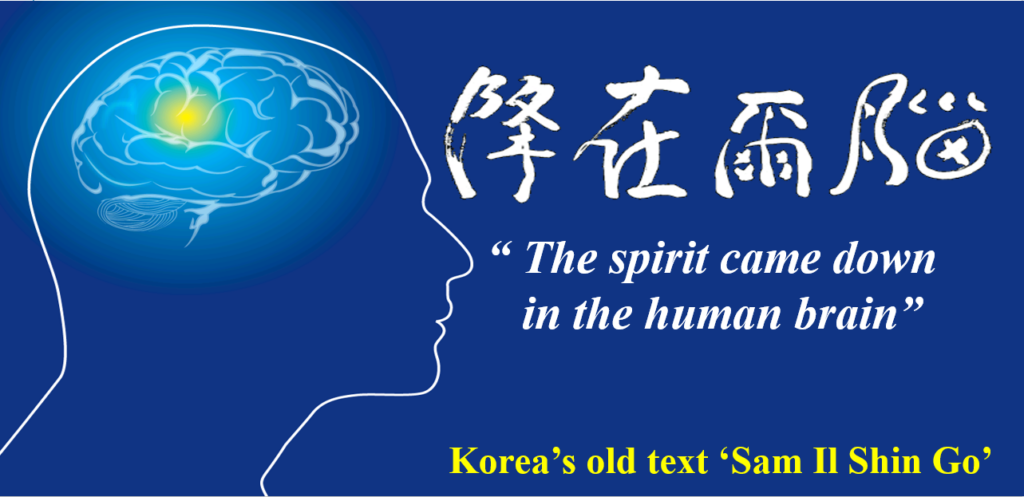Brain Philosophy
自性求子 降在爾腦 (The spirit came down in the human brain)
– Korea’s old text ‘Sam Il shin Go’
Brain Education is a meeting between 21st-century brain science and a spiritual and cultural asset of Korea 5000 years old.
Only as it entered the 20th century did the science of the West, which has led the way in improving material civilization, finally focused on the brain — through scientific and medical exploration of its functions and structures — as the key to changing minds and behaviors. However, thousands of years ago, ancient Koreans had already understood the essential value of the brain; building on this understanding, they created and sought to practice principles for life and a philosophy of education.

In the ancient Korean text Sam Il Shin Go – Shinhun Pyeon (Divine Decree of Three-in-One – Teachings on the Divine) is found a verse that reads, “Jasengguja gangjaeinoe (자성구자 강재이뇌, 自性求子 降在爾腦).” Interpreted, this means, “Search in your true nature. It has already come down and dwells in your brain.” This system of thought and training provided a philosophical and methodological foundation for today’s Brain Education. It also became the ideology underpinning the 1990 founding of the Korea Institute of Brain Science, which developed BOS, the source technology of Brain Education.
Ancient Koreans developed Sundo (선도, 仙道) — the original form of a culture of mind-body practice involving learning through experience and training mind and body together — based on the monist philosophy that mind and body are one, within the system of Chun Ji In (천지인, 天地人) Thought, which sees heaven, earth, and humanity as one. Over time, Sundo became a foundational method for cultivating talent at a national level in Korea.
Seeing heaven, earth, and humanity interconnected as one, Chun Ji In (천지인, 天地人) Thought suggests that the human body is a part of nature and that humanity and nature coexist. I believe that what’s vital in Sundo is feeling, not knowledge, and humankind recovering its original, innate senses.

Suseung Hwagang (수승화강, 水昇火降), meaning “water up fire down,” is a training principle of Sundo, which recognizes the human body as a part of nature and follows natural principles of circulation; this concept is a core health principle of today’s Brain Education.
“Seek for it in the body” describes the essence of Sundo. Since ancient times, Koreans have taught the practice of training mind and body together. This is also true of the Hwarang and Jouiseonin, national institutions for cultivating talented people to serve the state in the representative Korean dynasties of Silla and Goguryeo.
Sundo believes that body and mind shouldn’t be separated and that the human body is not made up of a “spirit” but of Jung-Ki-Shin energies, including energies connecting body and mind. Additionally, it believes that the body’s energy center, the dahnjon, exists in three locations: the upper, middle, and lower dahnjon centers. Sundo provides a system of principles leading to changes in individual consciousness: Jungchoong, Kijang, Shinmyung (정충기장신명, 精充氣壯神明), meaning when your vital energy (jung) is full, your heart energy (ki) matures, and your divine energy (shin) brightens.
This is why modern Brain Education recognizes three components of the human body — the physical, energy, and information bodies — and why it considers the energy connecting the seen and the unseen as the key mechanism of the system.
The spirit of Sundo, Seongtong Gongwan (achieving enlightenment and completion, 성통공완, 性通功完), calls us to live our lives contributing to the peace of all instead of stopping at individual enlightenment. It’s about pursuing a philosophy of respect for life (Chun Ji In), a view of humanity based on the interaction of body and mind, and a discipline of spiritual completion, with its principles and methodologies for growing human consciousness.
Brain Education aims to ask and answer questions about how everyone can use their brain well, not about exploring brain function. I believe that a proper brain philosophy is a fundamental asset. So the peace philosophy of Brain Education is rooted in Hongik Human (홍익인간, 弘益人間) Thought, which encompasses the universal spirit of humanity and the founding ideology of the ancient Korean kingdom of Dahngun Joseon: “working for the good of all.”
If we read the Budoji, which contains creation fables of ancient Korea, we find a story that tells of the existence of the ideal community of Mago Castle and of how the people there turned their backs on natural, absolute values to pursue artificial values, until they became mired in their senses and desires, and of how the eldest son, Hwanggung, left the castle. Later, the Vow of Restoration (Bokbon, 復本) to again establish a community where the true nature of humanity was alive, as in Mago Castle, was handed down from Hwanggung to Yuin, Hanin, Hwanung, and then to Dahngun Joseon, where it was used to establish a country based on Hongik Human ideology.
The Vow of Restoration of Mago Castle, by restoring balance between the two engines driving us toward a brighter future, the creativity and peacefulness of the human brain, orients Brain Education on creating a sustainable future for humanity and the earth and serves as a compass for a human civilization now adrift.

